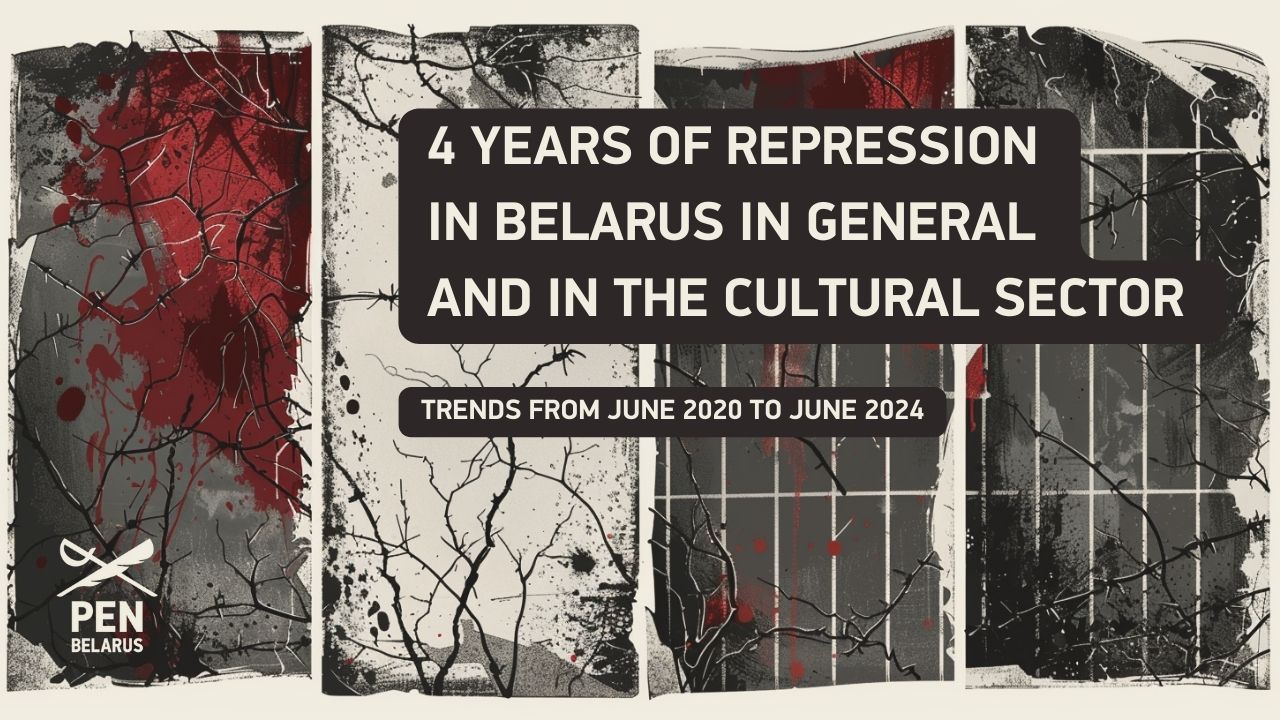
(2020–2023)
Detained and released without report
Good it was just three days, not a fine
Good there was no beating
Good it was a fine, not 24 hours
Good it was 24 hours, but at least with a mattress
Good it was 15 days, but not 30
Good there was no beating
Good it was straight 90 days, not criminal
Good it was a criminal case, no beatings
Good it was home chemistry, not chemistry [I]
Good it was chemistry, not years in prison
Good it was 2 or 3 years, not ten
Good it was in SIZA [II], not in a colony
Good it was a colony of the general regime, not the intensified [III]
Good there were letters, though it was the intensified
Good it was in a colony, not in PKT [IV]
Good it was in PKT, not in ŠYZA [V]
Good it was in ŠYZA, but healthy
Beaten up, but at least healthy
Good if that he got out, now planning treatment
Still in prison, but at least alive
I pray only that he gets out alive
Taciana Niadbaj
(Translation: John Farndon, Jenya Mironava)
Introduction
The human rights situation in Belarus in general and in the cultural sphere in international and national indices
Persecution of cultural figures: statistics
Repression: trends in general and in the cultural sector in particular in June 2020 – June 2024
Ten absurd examples of violations of cultural rights and human rights of cultural figures
Conclusion
Download the pdf version of the report
INTRODUCTION
As of the end of June 2024, there were 1,413 political prisoners in Belarus and the human rights situation in which Belarus finds itself after the 2020 presidential election continues to deteriorate. According to [1] human rights centre “Viasna”, courts have issued at least 5133 politically motivated verdicts in criminal cases in the four years of repression since the detention of political activist, blogger, and cultural manager Siarhiej Cichanoŭski, who became the first political prisoner for the 2020 events; at least 36,418 people have been subjected to administrative prosecution; more than 400 Belarusians are on the list of “terrorists”, 4,100 are labelled as “extremists”; 1,012 people had already served their sentences and were released; 6 people died behind bars…
Repression affects people of all ages, genders, levels of health, wealth, status, social activity, and professions – cultural figures, journalists, lawyers, athletes, medical personnel, academics, workers, believers and many other professional and social groups of people, as well as entire communities, are persecuted.
In October 2019, PEN Belarus started monitoring violations of rights in the cultural sphere, initially aimed at identifying, recording and analysing cases of violations further to discuss the state of affairs in the professional environment, interact with state bodies and remedy the situation in the cultural field of Belarus. The reality of the 2020 socio-political and legal crisis led to a different discourse and nature of violated rights against cultural workers and the impossibility of dialogue with the state authorities; in response, monitoring was reformatted into recording and analysing repression against cultural figures. Thus, for four years, we have been collecting cases of politically motivated persecution of cultural figures – arbitrary detentions, arrests, administrative and criminal prosecution, and facts of censorship and restricted access to audiences, ban on profession occur in Belarus every day, and more and more cultural workers fall under the millstone of repression.
In this material, we will:
- check international and national indices to see how the human rights situation in Belarus, in general and cultural rights in particular, has deteriorated over the past four years;
- see the minimum number of cultural figures already affected by the crackdown;
- analyse how persecution has changed over time;
- see the absurdity of what is happening in the country where people are imprisoned for “emoticons” on social media, and the leading “experts” in organising cultural and entertainment events are curators from the State Security Committee: “Every cultural institution has its own KGB supervisor who is in charge of the programme and knows what it is about. Our management used to tell us: “The supervisor came and said: do not do this, do not sing that” [2].
THE HUMAN RIGHTS SITUATION IN BELARUS IN GENERAL AND IN THE CULTURAL SPHERE IN INTERNATIONAL AND NATIONAL INDICES
According to the United Nations High Commissioner for Human Rights report, “numerous violations of international human rights law continued to be committed in Belarus between 1 May 2020 and 31 December 2023, mainly on grounds of real or perceived political opinion. Assessing the cumulative whole of evidence collected over the three years of the present mandate, OHCHR has reasonable grounds to believe that the crime against humanity of persecution may have been committed.”
How have four years of repression affected a country that has never been at the top of the rankings of political rights and civil liberties? Let’s look at the dynamics of international ratings and national indices.
Freedom in the World
Freedom House researchers assess the extent to which a country’s residents can enjoy each of the political rights and civil liberties mentioned in the Universal Declaration of Human Rights. For each of the ten indicators of political rights and 15 indicators of civil liberties, a country can receive from 0 to 4 points, resulting in the maximum possible number of freedom points in the rating – 100. In 2019, Belarus scored 19 points out of a possible 100 in the freedom ranking. In the last three years – 2022, 2023, 2024 – it has already scored 8 out of 100 points: 2 out of 40 possible for political rights and 6 out of 60 for civil liberties. Today, Belarus ranks last in the freedom rating of European states.
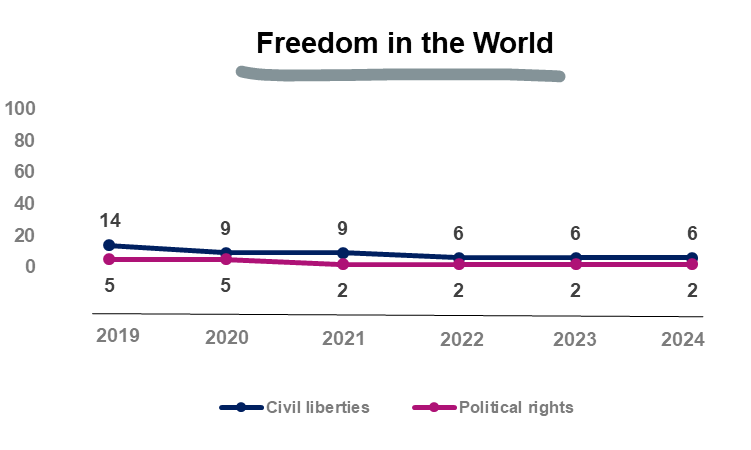
Worldwide Press Freedom Index
The international non-governmental organisation Reporters Without Borders (RSF) produces a ranking of the state of press freedom in each country worldwide. The index ranks states on the degree of press freedom in scores ranging from zero (the worst possible level) to 100 (the best). Belarus dropped from an index of 51.66 and “bad” status in 2019 to 37.17 and “very bad” in 2023. It is currently ranked 157th out of 180 countries in the world.
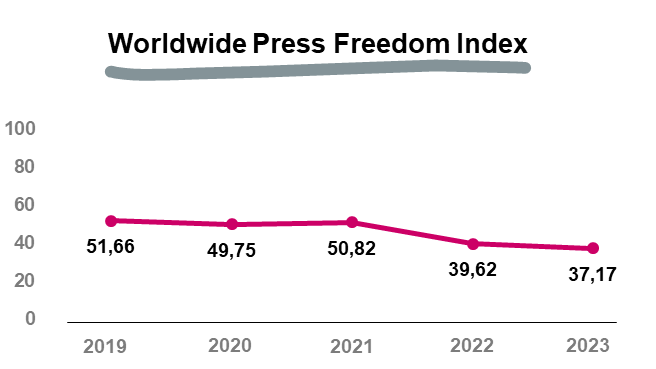
Other international indices
Freedom to Write Index. PEN America provides an annual report that tracks the detention and imprisonment of writers, scholars, and intellectuals worldwide who have been imprisoned or detained over the past year because of their writing or exercise of freedom of expression. Belarus, which was not even mentioned in the 2019 Index, has been consistently present in the Top 10 countries with the highest number of imprisoned writer(s) since 2020 and ranks sixth in the Index for 2023 [3].
Press Freedom in Europe. According to the report of the partner organisations of the Council of Europe’s (CoE) Platform for the Promotion of the Protection of Journalism and the Safety of Journalists in 2024, Belarus ranks first in Europe regarding the number of imprisoned journalists [4].
According to the 2024 ITUC Global Rights Index, a ranking of the International Trade Union Confederation, Belarus is among the Top 10 worst countries regarding respect for workers’ rights globally [5].
National studies
A group of civil society experts under the overall coordination of the Belarusian Helsinki Committee creates the National Human Rights Index in Belarus, which is an assessment of the human rights situation in three categories: civil and political rights; social, economic and cultural rights; and general measures. Experts assess the current situation and how it compares to the ideal situation. Based on this, a score is given on a 10-point scale, where 1 – reality does not correlate in any way with the perfect state of affairs, and 10 – the ideal state of affairs and reality coincide. In 2019, the National Human Rights Index was 4.1 points; in 2023, it is estimated 2.4 out of 10 points.
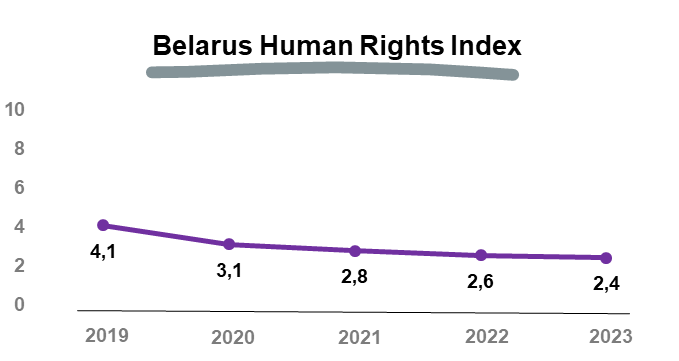
One of the areas where the deterioration is most substantial is the right to participate in cultural life. This index assesses four components: participation in cultural life, access to cultural life, contributing to cultural life, and the protection of cultural diversity. The right to participate in cultural life dropped from a score of 4.6 in 2019 to 1.4 out of 10 in 2023.
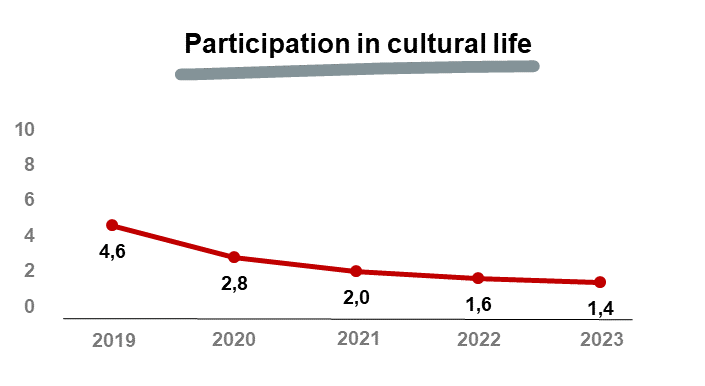
The Centre for European Transformation studies the cultural sphere in Belarus to monitor the implementation of the UNESCO Convention on the Protection and Promotion of the Diversity of Cultural Expressions by the Republic of Belarus. The assessment is made on five practical dimensions, which reflect the goals and principles of the UNESCO Convention, as well as changes in the deployment of cultural policy to achieve these goals and principles: conditions for the development and manifestation of cultural diversity, the impact of the cultural sector on the development of society, internal resources and the potential for the development of the cultural sphere, the development of intercultural interaction and contacts, and the interaction of cultural policy actors. The assessment scale is distributed from 0 to 30 points, where zero corresponds to the complete absence of development in this dimension, and 30 points – almost fully realising all the goals and principles set out in the UNESCO Convention. In 2019, the scores ranged from 9.7 to 13.4 out of 30 points (low to medium levels) and in 2022, from 5.4 to 8.4 (shallow to low levels). In 2019, the average value of the five dimensions assessing the implementation by the Republic of Belarus of the principles set out in the UNESCO Convention was 11.5 out of 30 possible points. Still, in 2023, it was only 6.6.
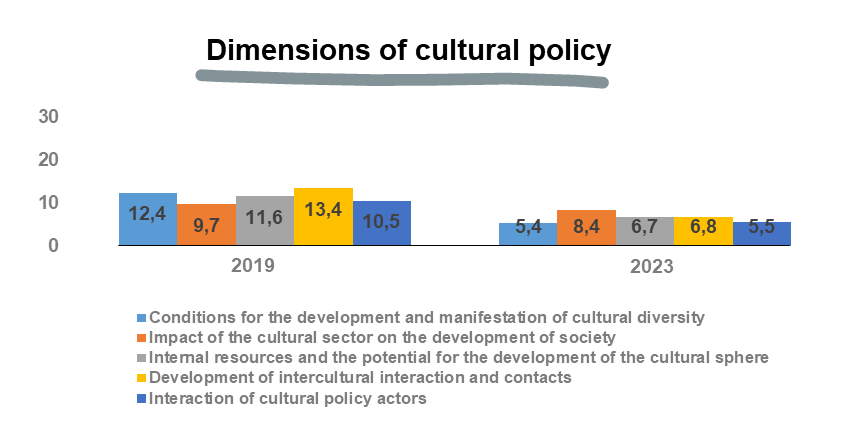
PERSECUTION OF CULTURAL FIGURES: STATISTICS
As of the end of June 2024, there were 1413 political prisoners in Belarus, including at least 105 cultural figures. At least 164 cultural workers are imprisoned, or their freedom is restricted to home confinement [6].
At least 69 cultural workers have been released, having fully served their unjust sentences. These, as well as all the figures below, are only the lower limit of the number of cultural figures who have been persecuted in one way or another: some of the repressions remain out of sight of human rights defenders and the general public, not all cases of persecution can be personalised, and not all persecuted cultural figures are currently known to us.
According to the monitoring data, at least almost 1,900 representatives of the cultural sphere have been subjected to politically motivated persecution and censorship since 2020.
- At least 5 cultural figures died at the hands of the regime. There is no reason not to consider the deaths of historian and director of the Vaŭlkavysk Museum Kanstancin Šyšmakoŭ in August 2020, artist Raman Bandarenka in November 2020, political prisoner activist and history promoter Vitold Ašurak in May 2021 as violent. Callous treatment and improper and untimely provision of medical care in places of confinement led to the death of political prisoners – cultural manager and blogger Mikola Klimovič in May 2023 and artist Aleś Puškin in July 2023.
- At least 960 cultural workers were arbitrarily detained (one or more times), 645 were administratively prosecuted (two or more times), and 370 were criminally prosecuted (one or more times).
- At least 295 criminal convictions (including five in absentia) were carried out against 281 cultural
- At least 208 cultural figures have been searched, while 137 have had their property confiscated.
- It is known that 26 people’s property was arrested, and special (in absentia) proceedings were initiated against 17 cultural figures who are outside Belarus.
- The regime included at least 209 cultural figures in the “List of citizens of the Republic of Belarus, foreign citizens or stateless persons involved in extremist activities” and 31 in the “List of organisations and individuals involved in terrorist”
- Information was recorded about 450 dismissed and 32 expelled from educational institutions, 8 cultural figures were deported.
- At this stage, it is impossible to estimate how many cultural workers:
-
- were (and are) being prosecuted for making cash donations to funds supporting the repressed in 2020 (and were forced to transfer hundreds of thousands of dollars to the state in exchange for the dismissal of a criminal case against them for allegedly “financing extremism”);
- have been (and continue to be) subjected to procedures of extensive searches and interrogations when crossing the Belarusian border;
- were (and are) censored and banned from distributing the products of their creativity;
- have been (and continue to be) insulted and vilified in the state media;
- went underground, resorted to self-censorship or left the country for personal security reasons.
Since the aftermath of the 2020 presidential election, more than a dozen independent publishing houses have been liquidated or forced to relocate. Significant art spaces, international centres (Goethe Institute, Polish Institute in Minsk, American Centre in Belarus, and others), and commercial shops that built their business on selling goods with national (white-red-white) symbols have also been closed.
Every fourth non-governmental organisation, including dozens of the oldest public associations in Belarus, was liquidated. On 9 August 2021, the Belarusian PEN Centre, an organisation founded back in 1989 and at the time of liquidation headed by Nobel laureate in literature Sviatlana Aleksievich, was forcibly liquidated. According to Lawtrend monitoring, by the end of June 2024, the losses in the non-governmental sector amounted to at least 1,686 institutionalised non-profits, 1,051 of which ceased to exist due to forced liquidation, including about 249 NPOs dealing with the development of the cultural sphere in Belarus.
The emigration of individuals and families and the relocation of companies and organisations continues to this day. The Belarusian Association of Journalists estimates that at least 400 independent journalists have left the country.
REPRESSION: TRENDS IN GENERAL AND IN THE CULTURAL SECTOR IN PARTICULAR
IN JUNE 2020 – JUNE 2024
The state’s primary goal is to suppress dissent and strengthen control over all aspects of society. The general conclusion regarding repression tendencies is that the boundary of what is permissible is being pushed further and further away.
“What was unacceptable before, some actions on the part of the authorities or functionaries, is now acceptable, and this boundary is being pushed further. What was impossible three years ago became possible two years later. Step by step, the situation is deteriorating.” [7]
Mass persecution and increase in the number of repressed
(from 103 criminal convictions in 2020 to 5133 at the end of May 2024)
“I even think that 30% of all Belarusians are convicts.” [9]
Repressions do not stop, and today, they affect not only opponents of the political regime – but sometimes their supporters as well. Last year alone, at least 1,603 people were convicted on politically motivated charges.
The number of criminal cases on charges of establishing, leading and participating in extremist formations, facilitating and financing extremist activities has increased noticeably; the number of criminal cases for participation in street protests and for statements on the Internet has remained significant.
At least 4,466 administrative rulings were issued during the year. According to the Viasna Human Rights Centre, a minimum of 5133 political sentences were passed in criminal cases – of which at least 2466 people were convicted for participating in protests (under Articles 342 and 293 of the Criminal Code). At least 36,418 people were subjected to administrative prosecution – in 2020-2021, mainly for peaceful actions, pickets and use of white-red-white symbols (under Article 24.23 of the CAO, formerly 23.34), in 2022-2024 – for subscriptions, reposts of independent media materials (under Article 19.11 of the CAO, formerly 17.11).
An example from the cultural sector:
The number of cultural figures affected by repression is also growing. If 470 people were recorded in the monitoring in 2020, as of June 2024, their number is already approaching 1,900.
Increased liability
(from 30 to 100 basic units of fine, from 15 to 30 days of arrest; from administrative to criminal prosecution, extension of terms of imprisonment)
“They have made the punishment more painful for any manifestation of civic stance.” [10]
Since 1 March 2021, authorities have significantly toughened punishment for administrative offences under “political” articles:
- Article 24.23 of the Code of Administrative Offences, “Violation of the order of organising or holding a mass event” (formerly 23.34), increased the maximum fine from 30 to 100 basic units (~ €1175) or 15 days of arrest, and in case of repeated prosecution within a year – from 50 to 200 basic units (~ €2350) or 30 days of arrest (previously – up to 15). This modification has made this offence the most “dangerous” – for example, “more dangerous” than illegal entrepreneurial activity, intentional infliction of bodily harm, destruction, or damage to historical and cultural values.
- Under Article 24.3 of the Code of Administrative Offences (Disobedience to a lawful order or request of an official in the exercise of its official powers), the punishment until 2021 was a fine of 2 to 50 basic units or administrative arrest; after 2021, it was from 2 to 100 basic units, community service, or administrative arrest.
If, in 2020, Belarusians were subjected to administrative prosecution for participation in peaceful protests (under Article 23.34 of the CAO), then since the end of 2022, there has been a practice of criminal prosecution (Article 342 of the Criminal Code) of those who were previously convicted under Article 23.34 of the CAO and went out on the roadway during the protests. Since de jure double prosecution for the same offence is inadmissible, the prosecutor’s office protests against bringing citizens to responsibility for an administrative case and thus creates a legal possibility for getting the citizen to criminal responsibility (cases of compensation for illegal administrative prosecution are not known) – de facto there is a double prosecution for one “offence”.
Since 2022, there has been a systematic effort to extend prison sentences – particularly by initiating new criminal cases for formal offences (under Article 411 of the Criminal Code, “Malicious disobedience to the requirements of the administration of a correctional facility”).
An example from the cultural sector:
On 11 July 2023, publicist and activist Dzmitry Daškievič was scheduled to walk free on the expiry of his 1.5-year sentence. However, that day, it became known that his transfer to a remand prison was based on a new prosecution under Article 411 of the Criminal Code.
Stricter conditions of confinement of political prisoners
(from communication and correspondence to incommunicado)
Imprisonment in Belarusian prisons causes significant (sometimes irreparable) damage to people’s health, leading, in some cases, to hospitalisation and even death.
The very first reports on the conditions of confinement of political prisoners contained information about callous treatment: placing them into a punishment cell, punitive confinement and cell-type room, deprivation of parcels or packages, meetings with relatives and lawyers, and many others.
In 2021, the public became aware of the visual segregation of such prisoners – a yellow tag on their clothing (meaning putting them on a prevention register).
Since 2022, there have been reports about changing the prison routine from the penal colony to the prison regime, which provides for the maximum number of restrictions for the prisoner and confinement in a cell – staying all the time within four walls.
Since 2023, some political prisoners have been held incommunicado for a lengthy period. The deaths in custody as a result of ill-treatment and failure to provide proper medical care (Mikalaj Klimovič, Aleś Puškin – in 2023; Vadzim Chrasko, Ihar Lednik, Aliaksandr Kulinič – in 2024).
An example from the cultural sector:
In August 2022, it became known that blogger and history promoter Eduard Palčys, initially sentenced to 13 years in a medium-security penal colony, was sentenced to a stricter punishment and was transferred to prison – the trial was held via Skype and lasted 5 minutes.
The criminalisation of any manifestation of solidarity
(from courtroom detentions to prosecution for donations and food aid to the repressed people)
Persecution for helping victims of repression: from non-admission to court hearings and detentions in the courtroom of those who came to support the defendants; persecution for supportive comments in social media, spreading the news about the life of political prisoners, to mass persecution since 2023 for donations* made in 2020 to funds to help victims of violence and persecution of Belarusians (BY_help, BYSOL, “Honest People”, “Country for Life” and other initiatives later designated as “extremist formations”); and in 2024 – for providing food aid to repressed families (social initiative INeedHelpBY) and letters to political prisoners (Facebook community “Letters of Solidarity Belarus 2020”).
*At the beginning of 2024, the Investigative Committee shared the work results on implementing the mechanism of “exemption from criminal liability of persons who financed extremist activities but confessed and made amends for the harm caused.” By the end of 2023, the amount of “charitable” donations paid to the state budget already exceeded 37 million Belarusian rubles (~ € 11,000,000).
An example from the cultural sector:
On July 2, 2024, librarian Irina Pogodaeva was sentenced to 3 years in prison for helping political prisoners – money transfers of 4-5 rubles for a total amount of 188 rubles (~ 54 €).
Expansion of the geography of repression and increased pressure on those who left the country
(proceedings in absentia against political emigrants, inability to exchange passports, designation of diasporas as “extremist formations”)
The Belarusian authorities take measures to suppress dissent inside and outside the country. The practice of defamation and discrediting opponents of the regime who left the country and continue to speak out about the situation in the country, which already took place in 2020, has been supplemented by such forms of persecution as searches at the place of residence and destruction of flats, initiation of criminal cases and putting the critics on the international wanted lists.
In mid-2022, the Law “On Amendments to the Criminal Procedure Code of the Republic of Belarus” came into force, introducing the institution of special (in absentia) criminal proceedings against defendants located outside Belarus. These norms, particularly the practice of their application in Belarus, contradict the basic international standards of criminal proceedings.
In 2023, amendments were made to the Law “On Citizenship of the Republic of Belarus,” which set forth the possibility of depriving Belarusians of citizenship for “extremist” activity; Belarusians from abroad are also deprived of the possibility of exchanging passports outside Belarus and selling immovable property and vehicles by a power of attorney issued outside Belarus.
The beginning of 2024 was marked by the designation of Belarusian diasporas as “extremist formations”, several criminal cases against groups of defendants, and a surge in reports from the Investigative Committee about the initiation of criminal cases in the framework of special proceedings. As of 21 June, criminal cases were initiated against 108 persons (the property of these persons has been seized, subsequently it can be sold by the state against the will of citizens). The links between those who left and those who stayed in the country are also becoming increasingly criminalised, and persecution is being extended to the relatives of political emigrants.
An example from the cultural sector:
The first sentence under the special proceedings – trial in absentia against a cultural figure – was carried out on 6 March 2023. Pavel Latuška, political and public figure, Minister of Culture of Belarus (2009–2012), Permanent Representative of Belarus to UNESCO (2012–2019), and Director General of the Janka Kupala National Academic Theatre (2019–2020), was sentenced in absentia to 18 years in prison.
Restriction on the exit from the country / Stricter border checks border
(from the procedure of additional inspection “according to the protocol” to mass checking of phones)
Since 2021, the Belarusians, kept in the database of the Ministry of Internal Affairs under the name “Riots” (information about those arrested under Article 24.23 of the Code of Administrative Offences – formerly 23.34 – and some others), have been subjected to a rather humiliating procedure of additional inspection at border checkpoints when crossing the state border when returning to Belarus. In some cases, such an inspection is quite tactful; in others, it goes as far as turning over belongings and stripping the inspected person. At the beginning of 2023, information about the stricter checks at the border began to appear. Added were “conversations” with representatives of law enforcement agencies and mobile phone checks for subscriptions to independent media and other communities from the list of “extremist materials”, examination of the contacts in the phone book, browser history, and photos. Such a check affects a much more comprehensive range of people. According to the Viasna Human Rights Centre data, in 2023, at least 207 people were detained after border checks.
It is known that the exit of former political prisoners from Belarus has been restricted since autumn 2022. Law No. 268-3 of 11 May 2023 allowed the State Security Committee to prohibit the exit from the country for up to six months for persons whose departure “contradicts the interests of national security.”
An example from the cultural sector:
Bard Aliaksandr Bal, dismissed in 2021 for political reasons from the Mahilioŭ Regional Drama Theatre after 26 years of work, was detained in June 2023 at the border after checks on his mobile phone. He received 15 days of administrative arrest for “distribution of extremist materials.”
Further legalisation of repression and increasing the scale of censorship
(“There is no place where one can speak out. People are afraid to speak out even in their kitchens” [11] )
Since 2022, the practice of suppressing dissent through the application of anti-extremist legislation against opponents of the regime has become widespread. The lists of persons allegedly involved in extremist or terrorist activities, the lists of extremist formations and extremist materials are regularly updated with new names and titles. The regime persecutes the dissent “according to the law.”
According to the Belarusian Helsinki Committee, to justify repression, more than 30 laws and other normative legal acts were amended in Belarus in 2023 alone. The “correct” civil society, parties, public and religious organisations are legally established. The possibility of establishing separate schools and preschool institutions and teaching in a minority language was abolished; the rights of Belarusians abroad have been restricted; amendments now also include a possibility of banning the activities of foreign mass media in Belarus; the death penalty for state treason committed by a government official or a military serviceman has been introduced; and other changes.
The same is happening in the cultural sphere: in 2022, the Code of the Republic of Belarus on Culture was substantially updated, with every second article (126 out of 257) modified. In particular, the Code initiated the creation of registers of organisers of cultural and entertainment events and the National Register of tour guides and guides-interpreters, the certification of which contains inherently discriminatory mechanisms.
During 2023, there was a further increase in legislated censorship and discrimination, which affected tour guides and guides-interpreters, artisans, agritourism estate owners, publishers, amateur aerial photographers, and organisers of cultural and entertainment events. The regulation of the latter illustrates well the process of establishing control over the independent [12] cultural sector and increasing the scale of censorship: thus, in August 2023, one year after the introduction of the “Register of Organisers of Cultural and Entertainment Events”, there were 706 organisers (737 titles, of which 31 were marked “excluded”), after the tightening of the requirements in autumn 2023 – 45 [13] (56 titles and 11 “excluded”). There are only 45 organisers allowed by the Ministry of Culture in a country with more than 9 million inhabitants.
An example from the cultural sector:
“When it comes to the situation inside the country, I would say that the law on the register has a decisive impact because it has become an additional hurdle in access to viewers.” [14]
Negative trends are also seen in such tendencies as [15] :
- stigmatisation of Belarusan national symbols and denigration of national culture;
- strengthening Russian influence, anti-Westernism;
- persecution for an anti-war stance and any form of expression different from the ideology of the state; militarisation;
- intimidating the population and encouraging denunciation;
- prosecution of former political prisoners;
- limiting the publicity of trials;
- economic pressure on the population;
- prohibition of the profession;
- other.
TEN ABSURD EXAMPLES OF VIOLATIONS OF CULTURAL RIGHTS AND HUMAN RIGHTS OF CULTURAL FIGURES
The following facts of persecution are arranged in chronological order.
- Persecution for creativity, participation in peaceful gatherings: “How’s your heart?”
Dzmitry Strojcaŭ, one of the most public poetic voices of the Belarusian protests, went out of his house into the street on 21 October 2020 and disappeared. It later became known that he was detained not far from his home, loaded into a minibus, handcuffed, and a bag over his head. “One leaned over to me and asked sympathetically: “How’s your heart?” They took me to the central KGB department (!), then to a district police station. The court ruled to arrest me for 13 days under Article 23.34 of the Code of Administrative Offences (participation in unauthorised events) for participating in one of the October peaceful rallies of dissent and protest [16]: “On October 4, 2020, in the period from 15:00 to 15:15 … moved together with other participants in the specified street procession, who were holding white-red-white flags in their hands and shouting slogans: “Long live Belarus!” and “Go away!” [Lukashenka]… ” (excerpt from the arrest report). - Harassment for creativity: “He was playing music”
Jazz musician Paviel Arakelian was detained on the evening of 7 November 2020 after his performance at one of the backyard concerts in Minsk: a group of riot police officers jumped out to the car, in which a friend drove the musician after the performance, and started pulling the door handles and shouting that they would break the windows. Then, they put both face down on the asphalt and shoved them into a silver minibus. Paviel Arakelian was taken to the Maskoŭski district police station and then to the isolation centre on Akrescina Street. [17] On 9 November, the court ruled that the musician should be arrested for participating in a courtyard concert for 15 days – with the wording in the police report that he was playing music and expressing disagreement with the current government. - Censored: “Understood”
In autumn 2020, relatives of lawyer, poet, and bard Maksim Znak [18], since 9 September 2020 imprisoned for his professional activities, received a letter from the pre-trial detention centre, which contained a small poem, almost entirely scrawled in pen – the prison censor left in it only the last word “Understood.”
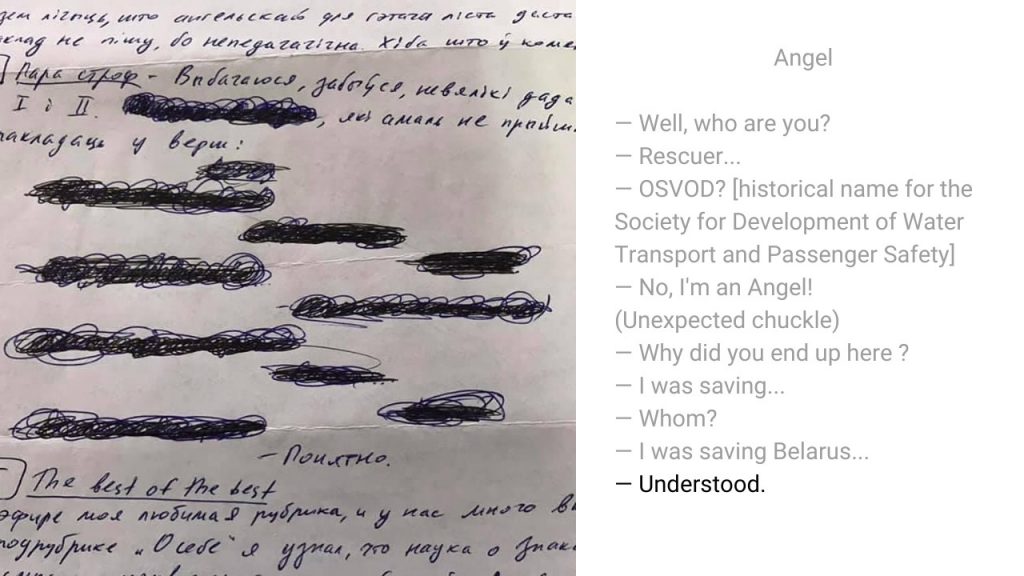
- Persecution for national symbols: “How was the tour? Did you like it?”
On 21 March 2021, Jury Kuŭšynaŭ, a junior researcher at the Museum of the Great Patriotic War, was detained in the centre of Minsk and arrested for 15 days. Earlier that Sunday afternoon, he had given a tour of the museum to the Faculty of Internal Troops of the Military Academy cadets, where, among other things, he spoke in detail about the white-red-white flag – “they seemed to be listening with great attention.” Later, the same cadets and their superiors were returning to their unit by metro, where they saw a badge with “Pahonia” on the background of the white-red-white flag on the backpack of one of the passengers – and called the OMON (riot police) detachment on him. The passenger turned out to be Juri Kuŭšynaŭ. [19] - Harassment for expressing an opinion: “He was defending himself and his family”
The name of music teacher Aksana Kaspierovič is listed under No. 818 in the “List of Organisations and Individuals Involved in Terrorist Activities”, a KGB list containing the names of international terrorists. Aksana Kaspierovič’s comments on Instagram, for which she served a sentence of 1 year and two months in prison and is listed as a “terrorist” in Belarus, concerned the high-profile murder of IT specialist Andrej Zeltser by KGB officers [20] and were as follows: “I watched the video of the flat seizure and realised: another act of lawlessness! What a pity for a guy who was defending himself and his family”, “The officer knew what he was doing. He is paid much money for this; it’s his job. And if I were the guy with the gun, I would be scared for myself and my family ((.” [21] - Conditions of confinement in closed institutions: “When do we have a library time?”
Publicist, blogger, and anarchist Mikalaj Dziadok [22] was detained for his civic activism in November 2020 and later sentenced to 5 years in a penal colony. He went through beatings, tasers, punishment cells, punitive confinement, cell-type rooms and other tortures. For example, in April 2022, Mikalaj was held for nine days in punitive confinement for asking prisoners from a neighbouring cell in the exercise yard, “When do we have a library time?“ - Prosecution for dissemination of information: “The Country in Tears”
In July 2022, Aksana Kolb, editor-in-chief of the Novy Čas (New Times) newspaper, in June 2021 sentenced to 2.5 years of home confinement for participating in the 16 August 2020 rally as evidenced in one photo, was awarded another 13 days of arrest for reposting on her Facebook page in May 2021 the song Country in Tears posted on Belsat’s YouTube channel. - Repressions in the book sector: “Liberated and imprisoned”
In April 2023, the registration certificate of the sole entrepreneur, Dzmitry Kolas, thanks to whom, during more than 30 years of activity of the publishing house “Zmitser Kolas”, the book market of Belarus was enriched with world literature in the best Belarusian translations, was terminated based on the suit of the Ministry of Information. The reason: the book by Doctor of Historical Sciences Aliaksandr Smaliančuk Liberated and Imprisoned – a collection of historical documents from the state archives of Belarus. It was published in 2021 and was not on sale anywhere. In 2023, it was included in the list of “extremist materials.” - Persecution for donations: “I’m not the first, I’m not the last”
These are the words of one of the cultural activists, spoken after a KGB officer called her and “invited” her to a conversation about her donation of $15 to one of the funds for the victims of repression (later designated as “extremist formations”) made in 2020. Using the threat of criminal prosecution, since 2023, security forces have summoned Belarusians to the KGB and the Financial Investigations Department (FDF) en masse and offered them to pay off: to transfer to one of the bank accounts suggested by an investigator the amount 10-1000 times higher than the donation made several years ago: $500 – in exchange for a $5 donation, 1000-2000-5000, etc. – for donations of $10, $23, $48, etc. Such donation is non-procedural and does not guarantee that criminal prosecution under Article 361-2 of the Criminal Code (Financing extremist activities) will not be re-initiated.

[She voluntarily reported one monetary transfer to the extremist organization “BYSOL” in the amount of [amount] US dollars (confession was taken), provided detailed explanations, attached screenshots with information about the specified transfer (account statement), information about transfers from her account on the internet resource “Facebook,” as well as a copy of the card check for the donation of funds to the charity account of the State Institution “RNPCT of Pediatric Oncology, Hematology, and Immunology” in the amount of [amount] rubles, as a voluntary compensation for damage and desire to atone for guilt.] - Without the right to create, without the right to live: “Canvas, oil”
On the night of 11 July 2023, political prisoner artist Aleś Puškin died as a result of brutal conditions of detention and inadequate medical care for a perforated ulcer. In March 2022, Aleś Puškin [23] was sentenced to 5 years of imprisonment in a maximum-security penal colony – for his portrait of Jŭhien Żychar* (“2014, canvas, oil, installation-frame, ~ 140×120 cm“)**.
* anti-Soviet partisan
** from Aleś Puškin’s letter “Why I wrote a portrait of Jaŭhien Żychar”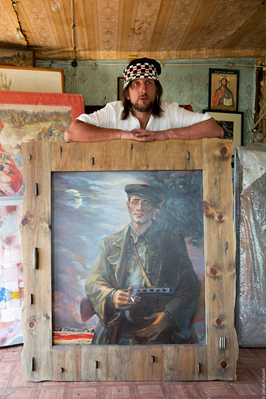
Photo: Janak Kouzel
CONCLUSION
“There was a time when there was some lull before the beginning of the war. But after the outbreak of the war, they started to arrest people for anti-war statements. When there were local elections in February 2024, a new wave of arrests and fines came because there was no money in Belarus. Silaviki needed their wages. They started to take money from people’s pockets to pay them high salaries. All of them. Now, they are waiting for Lukashenka’s re-election and pressing people badly.” [24]
On 5 May 2023, blogger and cultural manager Mikalaj Klimovič died in the Viciebsk colony. In February, he was sentenced to a year in a penal colony despite a Grade II heart disability. The crime he committed was a “funny” reaction to a satirical depiction of Lukashenka in the Odnoklassniki social network’s news feed. This tragic story is just one of hundreds and thousands of cases of systematic and purposeful suppression of dissent and civil liberties.
The Lukashenka regime continues to hold onto power through repression and total fear. To justify its actions, the illegitimate government changes laws, and the dependent judicial system actively participates in repression, ignoring the standards of a fair trial.
The human rights situation in Belarus is catastrophic, as noted by authoritative international organisations, and the problem is worsening, as confirmed by international and national indices and ratings.
We call on the international community to pay close attention to what is happening and to take action to protect human rights in Belarus. Recommendations from cultural organisations can be found here.
[1] As of 29 May 2024.
[2] From a non-public interview with cultural figures in the spring of 2024.
[3] According to the report, 16 people.
[4] According to the report, as of 31 December 2023, at least 37 journalists were imprisoned because of their professional activities.
[5] According to the report, 42 union leaders and members are in detention.
[6] Monitoring of violations in cultural sphere. Belarus, January – March 2024.
[7] From a non-public interview with cultural figures in the spring of 2023.
[8] Convicted in criminal political cases in 2020.
[9] From a non-public interview with cultural figures in the spring of 2024.
[10] From a non-public interview with cultural figures in the spring of 2023.
[11] From a non-public interview with cultural figures in the spring of 2024.
[12] Organisers of state bodies and state organisations do not require inclusion in this register.
[13] As of the end of June 2024.
[14] From an interview with cultural figures in the spring of 2023.
[15] Human rights in Belarus: the main trends of public policy’23.
[16] Dzmitry Strojcaŭ was detained.
[17] Paviel Arakelian was detained.
[18] People of word_ Maksim Znak.
[19] Detained for wearing a badge with “Pahony”.
[20] On 28 September 2021, KGB officers burst into the Minsk flat of IT specialist Andrei Zeltser, the owner of the flat and KGB officer Dzmitry Fedosiuk were killed in a shootout.
[21] “Political prisoners are treated worse than murderers”.
[22] People of word_ Mikoła Dziadok.
[23] Joint Statement from Belarus human rights defenders’ community on the death in prison of artist Aleś Puškin.
[24] From a non-public interview with cultural figures in the spring of 2024.
[I] “Chemistry” – a common sentence: imprisonment (restricted freedom) in an open-type correctional facility + hard labour. “Home chemistry” – when the sentence includes the wording “without being sent to an open-type correctional facility”. Your freedom is still restricted and you still have to do hard labor, but you are at home, although under police watch.
[II] SIZA – an infamous abbreviation for a “pretrial detention center”, where one is imprisoned while investigation goes on.
[III] Corrective colony regimes are categorized as “very strict/special, strict, general, and open” but according to Radio Svaboda, there are colonies of “strict, intensified, and general regime” in Belarus.
[IV] PKT, an abbreviation for a “cell-type space/room/premises/ward”. This is usually a space in a colony where one is sent for violating internal order, rules. One can be kept there for up to 6 months.
[V] ŠYZA, an abbreviation for “fine/penalty + isolator/isolation ward” – punitive confinement. This is more intense/severe than PKT.
